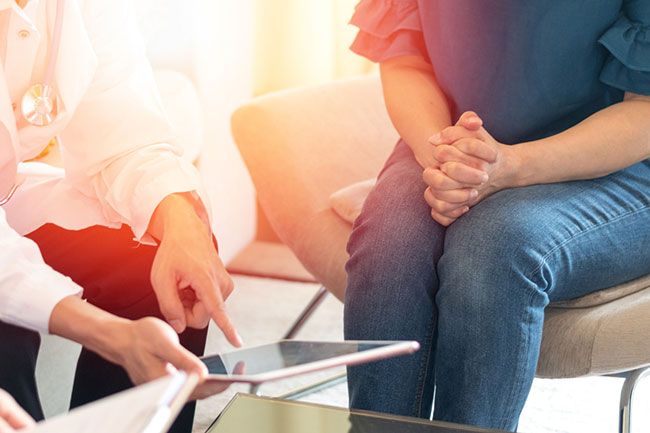A new NHS trial is offering 31,000 women in London "do-it-at-home" tests to check for early warnings of cervical cancer, it was announced in February. The idea is to encourage more women to get screened, bypassing any embarrassment they might feel and making things easier amid the COVID-19 lockdown.
DISCOVER: This life-saving COVID-19 gadget is a bargain on Amazon
We've all been guilty of forgoing medical appointments over the last year – after all, we're in the midst of a global pandemic! But when your NHS letter comes through your door inviting you for a smear test, don't hesitate to pick up the phone and book an appointment. COVID-19 anxiety about visiting your GP surgery and the fear of "wasting" key workers' precious time are common – but shouldn't come at the detriment of your own sexual health.
Gynaecologist and Obstetrician Dr Shree Datta, who works for intimate healthcare brand INTIMINA UK, told HELLO! why getting your smear test is more vital than ever. Read on to find out her answers to some of the most commonly asked questions...
What is cervical cancer?
Cervical cancer develops when the cells on your cervix, which lies at the neck of your womb, become increasingly abnormal. Over time, this develops into a tumour, which may spread into neighbouring structures such as your bladder or bowel. The cervix has two different types of cells - squamous and glandular, so if abnormalities appear, these may develop into two different types of cancer.
Here's everything you need to know about smear tests and cervical cancer
What is a smear test?
You can have your smear test at your GP practice or at a Sexual Health or Gynaecology clinic, ideally when you are not on your period. Medical staff will ensure you feel comfortable and gently insert a speculum into your vagina to visualise your cervix, which is at the neck of your womb.
When we inspect the cervix, we are checking for any irregularities or abnormalities on its surface. We will take a sample of the cells lining your cervix using a small brush and send these to the lab. All in all, taking a smear takes around 5 -10 minutes.
READ MORE: 9 best supplements to help boost your health during lockdown
What is the new NHS smear test trial?
In February, a new NHS smear test trial was announced, encouraging women to "self-sample" at home. Women aged 25-64 who are overdue for a check and living in the London boroughs of Barnet, Camden, Islington, Newham or Tower Hamlets will be offered kit from their GP or in the post. The "do-it-at-home" tests include a long, thin cotton bud, which is then sent off for testing in the post. Should the results detect the human papillomavirus (HPV) infection, the women will be called in to see their GP for a regular smear test.
What is the importance of a smear test?
A smear test involves taking a sample of the cells on your cervix, looking for infection with human papillomavirus (HPV). This is very common, but can alter the cells in your cervix over time, so if found on your smear, you may be referred to the hospital to see a Gynaecologist for further investigation. This is important because if abnormal pre-cancer cells on your cervix are not treated, they can eventually turn into cervical cancer.
How often should you get a smear test?
In England, between the ages of 25 and 50, you will be called for a smear test every 3 years. From the age of 50, you'll be asked to have a smear test every 5 years until the age of 65. If you experience symptoms such as abnormal bleeding or vaginal discharge, it's worth speaking to your doctor to see if you need a cervical smear test, even if you are not due for one.
What is the most common age for cervical cancer?
Cervical cancer is one of the few cancers that is more common in younger women. Over half of cervical cancer cases in the UK are seen in women under the age of 45, which is why it's important to attend when you are invited for a cervical smear.
Why is it important to get your smear test during the COVID-19 pandemic?
Your smear test is important as it can detect abnormal changes on your cervix early, so that you can receive treatment sooner rather than later if there's a problem. You may not have any symptoms at this stage, so a smear is the best way of checking your cervix.
DISCOVER: 8 incredible NHS heroes to follow on Instagram to get spot-on advice
Lockdown and fear of contracting COVID-19 needn't stop you from getting a smear test
Remember, these changes will continue during the pandemic, so if you receive an invitation for screening, contact your GP surgery. They can then tell you what safety measures are in place prior to making an appointment.
What if you're shielding or too nervous to visit your GP?
If you're shielding, it's important to follow the government's advice for your area. If you're invited for cervical screening during this time, discuss your risk of coronavirus with your GP team as they may have safety measures in place. It's difficult to know when the pandemic will end so it's difficult to know how long you may wait for a smear appointment, so it's important to weigh up your risk of coronavirus with the risk of delaying your screening appointment.
If you have symptoms of abnormal vaginal bleeding - for example, bleeding in between your period or after sex - abnormal vaginal discharge or have a previous abnormal smear, it's best to discuss this with your doctor. You may be able to attend first thing in the morning, for example, to minimise contact with others. If you're self-isolating, book your appointment after this period so that you do not spread coronavirus to others.
How has the pandemic had an impact on women's sexual health?
Initial data from Public Health England found a rise in HIV, STI and hepatitis tests and diagnoses after the first national lockdown restrictions were lifted. Lockdown and fear of contracting COVID-19 may have affected whether women come to see their doctor, for example and what facilities are available.
GET HEALTHY: 11 ways to sneak more fruit into your diet
We've had to review what services we can offer on the NHS during the pandemic to support critical care for COVID 19; overall, the number of consultations, tests, diagnoses and treatments were lower in the summer of 2020 than the corresponding period in 2019. We're trying to re-establish services where it's safe to do so. We realise this can cause a huge amount of anxiety and are working to meet demand.
Like this story? Sign up to our newsletter to get other stories like this delivered straight to your inbox.










